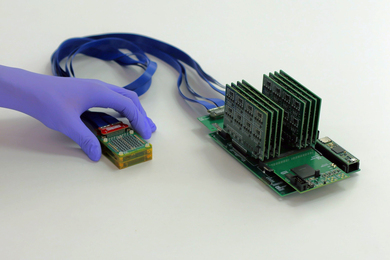The MIT Faculty Open Access Policy, one of the first initiatives of its kind in the United States, made a bold commitment to disseminate the results of MIT research and scholarship as widely and openly as possible. Recently, the MIT Libraries affirmed this commitment by signing an innovative agreement with Springer, one of the world’s largest scholarly publishers. Springer will send manuscripts of MIT-authored scholarly papers directly to the Open Access Articles Collection of DSpace@MIT, the Institute’s open access repository.
Users from all over the world access DSpace@MIT articles. In March 2016, downloads of the nearly 19,500 articles in the Open Access Articles Collection topped 5 million.
“Sharing knowledge with the world is fundamental to who we are — as librarians and as part of MIT,” says Chris Bourg, director of the MIT Libraries. “Making articles available freely online not only reflects our deeply held values, it helps the work emerging from MIT to have greater impact. We are grateful for Springer’s partnership in expanding that impact.”
Springer, which publishes books, e-books, peer-reviewed journals, protocols, and reference works in science, technology, and medicine, will automatically deposit to DSpace@MIT articles from 2012 onward with MIT faculty, researcher, or student authors. After a short embargo period, the articles will be freely available to the world.
Juliane Ritt, executive vice president of Global Hybrid OA Initiatives for Springer Nature said: “MIT was one of our first open access pilot partners, and this agreement facilitates the deposition of MIT-authored manuscripts into DSpace@MIT. This will take the administrative burden from authors and ensures that the institutional collection is complete. This latest step in our ongoing partnership underlines our pioneering role and longstanding commitment to open access and author services. We look forward to working with MIT to collect evidence from the pilot and measure its effects.”
The MIT Libraries developed the new auto-deposit agreement with input from the Faculty Committee on the Library System, a standing faculty committee that serves as a liaison between the Libraries and their users.
This new agreement is the latest experiment between the MIT Libraries and Springer, who have partnered since 2009 on initiatives to increase access to scholarly work. Other recent examples include a license for researchers to text and data-mine Springer materials for noncommercial purposes and a contract that allows MITx course teams to use Springer e-journals and e-books in their classes.






